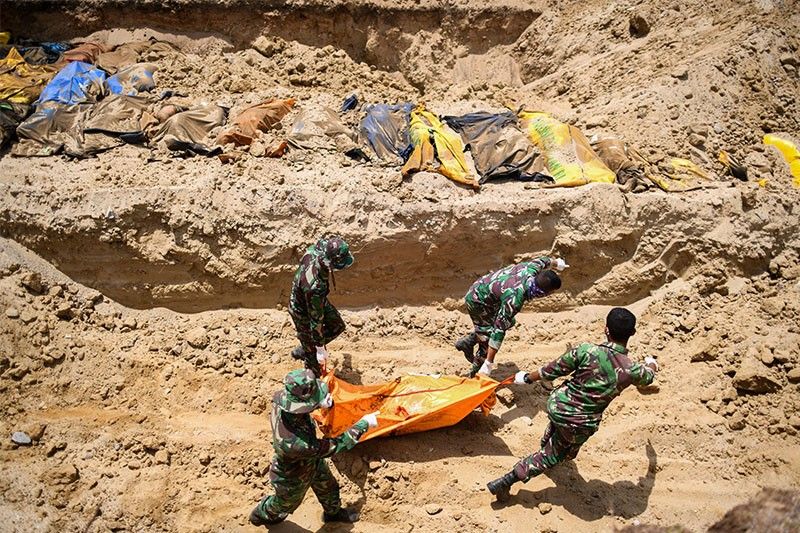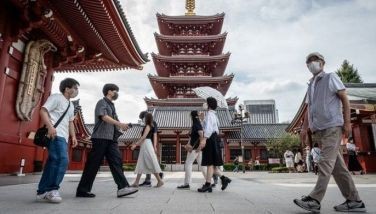Time running out for survivors as Indonesia toll tops 1,400

WANI, Indonesia — The death toll in Indonesia's twin quake-tsunami disaster passed 1,400 Wednesday, with time running out to rescue survivors and the UN warning of "vast" unmet needs that have fuelled looting.
Indonesian soldiers have been ordered to fire on those raiding stores on the quake and tsunami-struck island of Sulawesi, a colonel told AFP, after desperate survivors emptied shops of food and water.
Meanwhile the authorities have set a tentative deadline of Friday to find anyone still trapped under rubble, at which point -- a week after this devastating double disaster -- the chances of finding survivors will dwindle to almost zero.
Military spokesman M. Thohir said the number of confirmed dead has risen to 1,411, while the disaster agency said 519 bodies have already been buried.
Government rescue workers seeking survivors are focusing on half a dozen key sites around the seaside city of Palu -- the Hotel Roa-Roa where up to 60 people are still believed buried, a shopping mall, a restaurant and the Balaroa area where the sheer force of the quake turned the earth temporarily to mush.
At a minimum, 150 people are unaccounted for beneath the rubble, officials said.
According to the UN's humanitarian office almost 200,000 people need urgent help, among them tens of thousands of children, with an estimated 66,000 homes destroyed or damaged by the 7.5-magnitude quake and the tsunami it spawned.
Despite the Indonesian government having earlier urged foreign rescue teams to "stand down" because the crisis was in hand, residents in hard-hit, remote villages like Wani in Donggala province say little help has arrived and hope is fading.
"Twelve people in this area haven't yet been found," Mohammad Thahir Talib told AFP.
"In the area to the south, because there hasn't been an evacuation we don't know if there are bodies. It's possible there are more," the 39-year-old said.
The Red Cross expressed frustration at the slow pace of the response.
"There are still large areas of what might be the worst-affected areas that haven't been properly reached, but the teams are pushing, they are doing what they can," said Matthew Cochrane, a spokesman for the International Federation of Red Cross and Red Crescent Societies (IFRC).
The World Health Organization has estimated that across Donggala, some 310,000 people have been affected by the disaster.
Survivors are battling thirst and hunger, with food and clean water in short supply, and local hospitals are overwhelmed by the number of injured.
Officials on the ground said that while the government had now invited offers of help, there is still no "mechanism for this to be implemented".
Landing slots at Palu airport are snapped up by the Indonesian military, although it was slated to be open to commercial flights from 7:59am on Thursday (2359 GMT Wednesday).
Signs of desperation are growing, with police officers forced to fire warning shots and teargas to ward off people ransacking shops.
"If there is looting again, we will quickly fire a warning shot and then shoot to immobilise," said military colonel Ida Dewa Agung Hadisaputra.
Six of the Indonesian social affairs ministry's trucks laden with supplies were reportedly looted enroute to Palu and on one route out of the city, an AFP journalist saw youths blocking the road and asking for "donations".
On the outskirts of the city, hundreds of people sifted through the ruins of a collapsed factory, salvaging food, drinks and construction materials.
Indonesia President Joko Widodo, who faces reelection next year, insisted the military and the police were in full control. "There is no such thing as looting," he said on a visit to Palu.
- Body bag shortage -
As survivors pick through the shattered remains of their neighbourhoods, the death toll continues to rise.
The Indonesia-based ASEAN Coordinating Centre for Humanitarian Assistance said that more body bags were "urgently" needed as fears grow that decomposing corpses could provide a breeding ground for deadly diseases.
Rescue efforts have been hampered by a lack of heavy machinery, severed transport links and the scale of the damage.
In yet another reminder of Indonesia's vulnerability to natural disasters, the Soputan Volcano in Sulawesi erupted Wednesday, spewing volcanic ash up to 4,000 metres above the crater.
- 'There's no toilet' -
With power returning to parts of Palu late Tuesday, phone networks back up and running and even some markets opening for business, there were the faintest signs of things getting back to normal.
But for most, daily life has changed beyond all recognition.
Palu residents crowded around daisy-chained power strips at the few buildings with electricity, or queued for water, cash or petrol being brought in via armed police convoy.
Queues to get a few litres of petrol lasted more than 24 hours in some places.
Sanitation is also a growing problem. "People everywhere want to go to the toilet but there's no toilet. So we do it along the road at night," said 50-year-old Armawati Yarmin.
Indonesia sits along the Pacific "Ring of Fire", the world's most tectonically active region, and its 260 million people remain hugely vulnerable to earthquakes, tsunamis and volcanic eruptions. — with Patrick Lee in Sigi and Kiki Siregar in Jakarta
Thirty bodies are lying at one Indonesian hospital after a quake and tsunami struck Sulawesi island, smashing into a city of 350,000 people, a hospital official tells a TV station.
Friday's tremor was centred 78 kilometres north of Palu, the capital of Central Sulawesi province, but was felt in the far south of the island in its largest city Makassar and on the neighbouring island of Kalimantan, Indonesia's portion of Borneo island.
The initial tremor, which was followed by a series of powerful aftershocks, struck as evening prayers were about to begin in the world's biggest Muslim majority country on the holiest day of the week, when mosques are especially busy.
Indonesia is one of the most disaster-prone nations on earth.
It lies on the Pacific "Ring of Fire", where tectonic plates collide and many of the world's volcanic eruptions and earthquakes occur. — AFP
The disaster agency says the Indonesia quake death toll rises to 310.
Shrieking with delight, Indonesian kids in disaster-struck Palu rush to cuddle a giant Winnie the Pooh, his horseplay and goofy smiles drawing big smiles in a park surrounded with rubble.
Volunteers are cheering up children across Palu with songs and games as the youngsters come to grips with a city hollowed out and twisted by nature.
An earthquake and tsunami on September 28 has killed close to 2,000 on Sulawesi island and the carnage is still raw, with thousands more believed buried underneath the rubble. — AFP
Rescuers picking through the grim aftermath of Indonesia's quake-tsunami issues a fresh public health warning as more decaying corpses were unearthed from beneath the ruined city of Palu.
Officials says the death toll had climbed to 1,649 with more than a thousand maybe still missing in the seaside city on Sulawesi island, after the region was hit by a powerful quake and a wall of water. — AFP
Indonesia's disaster agency says the death toll from the earthquake and tsunami that struck the Sulawesi island last week has risen to 1,649.
Agency spokesman Sutopo Purwo Nugroho says 265 people are reportedly missing, though more may be buried under deep mud and the rubble of homes and buildings that have collapsed.
He provided the updated figure Saturday at a news conference in Jakarta.
The twin disasters struck Palu and surrounding districts in Central Sulawesi province on Sept. 28. — AP
Indonesia's disaster agency says the death toll from the earthquake and tsunami that struck central Sulawesi island a week ago has surged past 1,500.
The agency, which earlier Thursday says the death toll was 1,424, updated the number of dead to 1,558 on Twitter later the same day.
The disasters struck Palu and surrounding districts in Central Sulawesi province last Friday. — AP
- Latest
- Trending
































